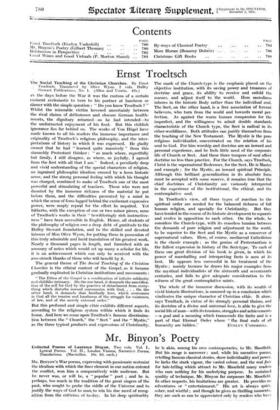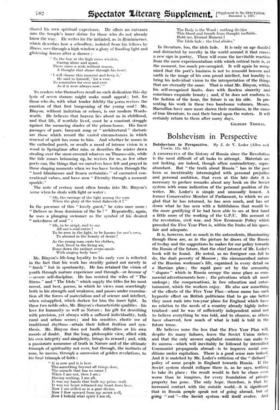Mr. Binyon's Poetry
Collected Poems of Laurence Binyon. Two vols. Vol. I., Lyrical Poems. Vol. II., London Visions, Narrative Poems, Translations. (Macmillan. 10s. 6d. each.) Ma. BINYON'S War poems, expressing with passionate restraint the idealism with which the finer element in our nation entered
the conflict, won him a comparatively wide audience. But he never was, or will be, a " popular " poet ; and he is, perhaps, too much in the tradition of the great singers of the past, who sought to probe the riddle of the Universe and to justify the ways of God to man, to win his due meed of recog- nition from the criticism of to-day. In his deep spirituality
he is akin, among his own contemporaries, to Mr. Masefield. But his range is narrower ; and, while his narrative poems, retelling famous classical stories, show individuality and power, he lacks the stark vigour, the varied colour, and the real flair for tale-telling which attract to Mr. Masefield many readers who care nothing for his underlying purpose. In sustained quality of technique, Mr. Binyon far surpasses Mr. Masefield. In other respects, his limitations are greater. He provides no adventures or " entertainment." His art is always quiet, sober, and wistful ; and though he gives us thrilling moments, they are such as can be appreciated only by readers who have
shared his own spiritual experience. He offers no entrance into the temple's inner shrine for those who do not already
know the way. He writes for the initiated, as in Reminiscence, which describes how a schoolboy, isolated from his fellows by
illness, sees through a high window a glory of flooding light and glistening leaves after a shower : •
" To the boy at the high room window, Gazing alone and apart,
There came a wish without reason.
A thought that shone through his heart.
I will choose this moment and keep it,' He said to himself, for a vow, To remember for ever and ever As if it were always now.' "
To readers who themselves recall no such dedication this shy lyric of seven stanzas might make small appeal ; but, for
those who do, with what tender fidelity the poem revives the emotion of that first burgeoning of the young soul ! Mr. Binyon, without imitation or echoes, is our modern Words- worth. He believes that heaven lies about us in childhood, and that life, if worthily lived, must be a constant struggle against the menacing shades of the prison-house. His finest passages of pure, buoyant song or " architectural " rhetoric are those which record the varied circumstances in which renewal of spirit has come to him. And whether he muses in the cathedral porch, or recalls a mood of intense vision in a wood in Springtime after rain, or describes the winter dawn stealing over the snow-covered wharves on Thames-side, while the tide comes brimming up, he revives for us, as few other poets can, the things that we ourselves have felt and prayed in those shaping moments when we too have broken through the " hard blindnesses and frozen certainties " of encrusted con- ventional values, and have seen " Eternity through a moment sparkle."
The note of ecstasy most often breaks into Mr. Binyon's verse when he deals with light or water :
" Oh, the carriage of the light among the corn When the glory of the wind dishevels it ! "
In the presence of this " lovely guest," he cries once more " Deliver us from dominion of the lie ! " Repeatedly, again, he uses a plunging swimmer as the symbol of his desired " nakedness of soul " :
" Oh, to be stript, and to use All one's soul entire !
To be seen in the light, to be known for one's own, . To abound in the beauty of desire !
As the young man casts his clothes, And, freed to the living air, Runs down the radiant ocean-sands • With singing body bare."
Mr. Binyon's life-long loyality to his early vow is reflected in the fact that his work has steadily gained not merely in " finish " but in spontaneity. He has retained the vision of youth through mature experience and through—or because of —severe self-discipline. He has resisted the -wiles of " The Sirens " and " The Idols " which supply the titles for his most recent, and best, poems, in which he views man searchingly both in his strength and weakness, and passes under examina- tion all the forces of materialism and of science and intellect, when misapplied, which darken for him the inner light. In these two noble odes, Mr. Binyon's characteristic qualities—his love for humanity as well as Nature ; his gift for describing with precision, yet always with a suffused individuality, both rural and urban scenes ; and his sensitive, elastic use of traditional rhythms—attain their fullest fruition and syn- thesis. Mr. Binyon does not baulk difficulties or his own moods of doubt. But the long, philosophic view, allied with his own integrity and simplicity, brings its reward ; and, with a passionate assurance of truth in Nature and of the ultimate triumph of spirituality not over, but through, the instincts of man, he moves, through a succession of, golden revelations, to his final triumph of faith : " It is now and it is here
The something beyond all things dear, The miracle that has no name !
When I am not, then I turn`'
Having nothing, I am all.
It was my hands that built my prisoz,-wall, It was my heart refrained my heart from loVe.
Now I am stifled as in a gaze divine, Now I flow upward from my secret rell,
- Now I-behold what Spirit-I- any of, The Body is the Word ; nothing divides
This blood and breath from thought ineffable. Hold me, Eternal Moment
The Idols fade : the God abides."
In literature, too, the idols fade. It is only an age dazzled
and distracted by novelty in the world around it that craves . a new sign in poetry. There will come the inevitable reaction from the mere experimentalism with which critical taste is,. at the moment, too much pre-occupied. It will again be recog- nized that the poet's business is not to remould heaven and earth in the image of his own proud intellect, but humbly to bring his individual vision to the interpretation of the things that are eternally the same. That is what Mr. Binyon, within his self-recognized limits, does with flawless sincerity and sometimes exquisite beauty ; and, if he does not conform to the fashion of the hour, the future is on his side. In pre- senting his work in these two handsome volumes, Messrs. Macmillan have once more shown their readiness, in the cause of true literature, to cast their bread upon the waters. It will certainly return to them after many days.
GILBERT THOMAS.











































 Previous page
Previous page